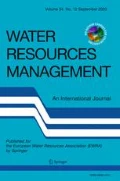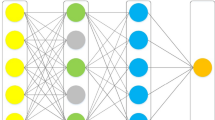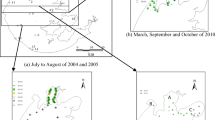Abstract
Chlorophyll-a (hereafter referred to as Chl-a) is a recognized indicator for phytoplankton abundance and biomass –hence, an effective estimation of the trophic condition– of water bodies as lakes, reservoirs and oceans. Indeed, Chl-a is the primary molecule responsible for photosynthesis. A strong and robust Bayesian nonparametric technique, termed Gaussian process regression (GPR) approach, for foretelling the dependent variable Chl-a concentration in Tanes reservoir from a dataset concerning to 268 samples is shown in this paper. Ten years (2006–2015) of monitoring water quality variables (biological and physico-chemical independent variables) in the Tanes reservoir were used to build this mathematical GPR-relied model. As an optimizer, the method known as Limited-memory Broyden-Fletcher-Goldfarb-Shanno (LBFGSB) iterative algorithm was used; this allows the selection of kernel optimal parameters during the GPR training phase, which greatly determines the regression precision. The results of the current investigation can be summarized in two. Firstly, the relevance of each input variable on Chl-a concentration in Tanes reservoir is determined. Secondly, the Chl-a can be successfully predicted using this hybrid LBFGSB/GPR–relied model (R2 and r values were 0.8597 and 0.9306, respectively). The concordance between observed data and the model clearly proves the high efficiency of this innovative approach.







Similar content being viewed by others
References
Abirhire O, North RL, Hunter K, Vandergucht DM, Sereda J, Hudson JJ (2015) Environmental factors influencing phytoplankton communities in Lake Diefenbaker, Saskatchewan. Canada J Great Lakes Res 41:118–128
Akhlaghi YG, Sudong Z, Shittu S, Badiei A, Cattaneo MEGV, Xiaoli M (2019) Statistical investigation of a dehumidification system performance using Gaussian process regression. Energ Buildings 202:109406
Alghamdi AS, Polat K, Alghoson A, Alshdadi AA, Abd El-Latif AA (2020) Gaussian process regression (GPR) based non-invasive continuous blood pressure prediction method from cuff oscillometric signals. Appl Acoust 164:107256
Álvarez Cobelas M, Arauzo M (2006) Phytoplankton responses to varying time scales in a eutrophic reservoir. Arch Hydrobiol Ergebn Limnol 40:69–80
Ambrogioni L, Maris E (2019) Complex-valued gaussian process regression for time series analysis. Signal Process 160:215–228
American Public Health Association, American Water Works Association, Water Environment Federation (2005) Standard methods for the examination of water and wastewater, no 21. APHA/AWWA/WEF, Washington
Bishop CM (2011) Pattern recognition and machine learning. Springer, New York
Brönmark C, Hansson L-A (2005) The biology of lakes and ponds. Oxford University Press, New York
Brown CD, Hoyer MV, Bachmann RW, Canfield DE Jr (2000) Nutrient-chlorophyll relationships: an evaluation of empirical nutrient-chlorophyll models using Florida and northern temperate lake data. Can J Fish Aquat Sci 57:1574–1583
Byrd RH, Lu P, Nocedal J, Zhu C (1994) A limited-memory algorithm for bound constrained optimization. SIAM J Sci Comp 16:1190–1208
Cai H, Jia X, Feng J, Li W, Hsu Y-M, Lee J (2020) Gaussian process regression for numerical wind speed prediction enhancement. Renew Energ 146:2112–2123
Chen CW (1970) Concepts and utilities of ecologic model. J Sanit Eng Div 96:1086–1097
Ciaburro G (2017) MATLAB for machine learning. Packt Publishing, Birmingham, UK
Daemi A, Kodamana H, Huang B (2019) Gaussian process modelling with Gaussian mixture likelihood. J Process Contr 81:209–220
Di Toro DM, O'Connor DJ, Thomann RV (1971) A dynamic model of the phytoplankton population in the Sacramento-San Joaquin Delta. In: Non equilibrium systems in natural water chemistry, Advances in Chemistry Series, American Chemical Society, New York, vol 106, pp. 131–150
Directive 2000/60/EC of the European parliament and of the council of 23 October 2000. Establishing a framework for community action in the field of water policy, L-327, Luxembourg
Duan Y, Cooling C, Soo Ahn J, Jackson C, Flint A, Eaton MD, Bluck MJ (2019) Using a Gaussian process regression inspired method to measure agreement between the experiment and CFD simulations. Int J Heat Fluid Fl 80:108497
Dym H, McKean HP (2008) Gaussian processes, function theory, and the inverse spectral problem. Dover, New York
Ebden M (2015) Gaussian processes: a quick introduction. https://arxiv.org/pdf/1505.02965.pdf.
Fei Y, Rong G, Wang B, Wang W (2014) Technical section: parallel L-BFGS-B algorithm on GPU. Comput Graph 40:1–9
Fields S (2004) Global nitrogen: cycling out of control. Environ Health Persp 112(10):A556–A563
Gao A, Liao W (2019) Efficient gravity field modeling method for small bodies based on Gaussian process regression. Acta Astronaut 157:73–91
Gonçalves IG, Echer E, Frigo E (2020) Sunspot cycle prediction using warped Gaussian process regression. Adv Space Res 65(1):677–683
GPy (2014) A Gaussian process framework in python. http://github.com/SheffieldML/GPy.
Kalaji HM, Sytar O, Brestic M, Samborska IA, Cetner MD, Carpentier C (2016) Risk assessment of urban lake water quality based on in-situ cyanobacterial and total Chl-a monitoring. Pol J Environ Stud 25:45–56
Knafl GJ, Ding K (2016) Adaptive regression for modeling nonlinear relationships. Springer, Berlin
Lantz B (2019) Machine learning with R: expert techniques for predictive modeling. Packt Publishing, Birmingham, UK
Latif Z, Tasneem MA, Javed T, Butt S, Fazil M, Ali M, Sajjad MI (2003) Evaluation of water-quality by chlorophyll and dissolved oxygen. In: Water resources in the south: present scenario and future prospects. Commission on Science and Technology for Sustainable Development in the South, Islamabad, Pakistan, pp 122–135
Li X, Yuan C, Li X, Wang Z (2020a) State of health estimation for Li-Ion battery using incremental capacity analysis and Gaussian process regression. Energy 190:116467
Li M, Sadoughi M, Hu Z, Hu C (2020b) A hybrid Gaussian process model for system reliability analysis. Reliab Eng Syst Safe 197:106816
Liu DC, Nocedal J (1989) On the limited memory BFGS method for large scale optimization. Math Program 45:503–528
McClave JT, Sincich TT (2016) Statistics. Pearson, New York
McQuaid N, Zamyadi A, Prevost M, Bird DF, Dorner S (2011) Use of in vivo phycocyanin fluorescence to monitor potential microcystin-producing cyanobacterial biovolume in a drinking water source. J Environ Monit 13:455–463
Moura Ado N, do Nascimento EC, Dantas EW (2012) Temporal and spatial dynamics of phytoplankton near farm fish in eutrophic reservoir in Pernambuco, Brazil. Rev Biol Trop 60(2):581–597
Negro AI, de Hoyos C, Vega JC (2000) Phytoplankton structure and dynamics in Lake Sanabria and Valparaíso reservoir (NW Spain). Hydrobiologia 424:25–37
Paananen T, Piironen J, Andersen MR, Vehtari A (2019) Variable selection for Gaussian processes via sensitivity analysis of the posterior predictive distribution. In: Proceedings of the 22nd international conference on artificial intelligence and statistics (AISTATS), proceedings of machine learning research (PMLR). Naha, Okinawa, Japan, pp 1743–1752
Pasolli L, Melgani F, Blanzieri E (2010) Gaussian process regression for estimating chlorophyll concentration in subsurface waters from remote sensing data. IEEE Geosci Remote S 7(3):464–468
Patrick R, Crum B, Coles J (1969) Temperature and manganese as determining factors in the presence of diatom or blue-green algal floras in streams. Proc National Acad Sci 64(2):472–478
Piironen J, Vehtari A (2016) Projection predictive model selection for Gaussian processes. In: IEEE 26th International Workshop on Machine Learning for Signal Processing (MLSP), IEEE Publisher. Vietri sul Mare, Italy, pp 1–6
Pip E, Bowman L (2014) Microcystin and algal chlorophyll in relation to nearshore nutrient concentrations in Lake Winnipeg, Canada. Environ Pollut 3(2):36–47
Quesada A, Moreno E, Carrasco D, Paniagua T, Wormer L, de Hoyos C, Sukenik A (2006) Toxicity of Aphanizomenon ovalisporum (Cyanobacteria) in a Spanish water reservoir. Eur J Phycol 41:39–45
Rasmussen CE (2003) Gaussian processes in machine learning: summer school on machine learning. Springer, Berlin
Rasmussen CE, Williams CKI (2005) Gaussian processes for machine learning. The MIT Press, Cambridge, MA, USA
Redden AM, Rukminasari N (2008) Effects of increases in salinity on phytoplankton in the Broadwater of the Myall Lakes, NSW, Australia. Hydrobiologia 608:87–97
Reynolds CS (2006) Ecology of phytoplankton. Cambridge University Press, New York
Riegl B, Glynn PW, Wieters E, Purkis S, d'Angelo C, Wiedenmann J (2014) Water column productivity and temperature predict coral reef regeneration across the Indo-Pacific. Sci Rep 5:8273–8279
Rychlik I, Johannesson P, Leadbetter MR (1997) Modelling and statistical analysis of ocean-wave data using transformed Gaussian processes. Mar Struct 10(1):13–47
Schinck M-P, L’Ecuyer-Sauvageau C, Leroux J, Kermagoret C, Dupras J (2020) Risk, drinking water and harmful algal blooms: a contingent valuation of water bans. Water Resour Manag 34:3933–3947
Seeger M (2000) Bayesian model selection for support vector machines, Gaussian processes and other kernel classifiers. In: NIPS'99 Proceedings of the 12th International Conference on Neural Information Processing Systems, MIT Press Cambridge, MA, USA, vol 12, pp 603–609
Sheldon SP, Skelly DK (1990) Differential colonization and growth of algae and ferromanganese-depositing bacteria in a mountain stream. J Freshw Ecol 5(4):475–485
Smith VH (2006) Responses of estuarine and coastal marine phytoplankton to nitrogen and phosphorus enrichment. Limnol Oceanogr 51:377–384
Smith MJ, Shaw GR, Eaglesham GK, Ho L, Brookes JD (2008) Elucidating the factors influencing the biodegradation of cylindrospermopsin in drinking water sources. Environ Toxicol 23:413–421
Stone JV (2016) Bayes' rule with python: a tutorial introduction to Bayesian analysis. Sebtel Press, London
Texeira MR, Rosa MJ (2006) Comparing disolved air flotation and conventional sedimentation to remove cyanobacterial cells of Microcystis aeruginosa: part I: the key operating conditions. Sep Purif Technol 52:84–94
Tufford DL, McKeller HN (1999) Spatial and temporal hydrodynamic and water quality modeling analysis of a large reservoir on the South Carolina (USA) coastal plain. Ecol Model 114:137–173
United States Environmental Protection Agency (2014) Chapter 4: Eutrophication. http://www.epa.gov/emap2/maia/html/docs/Est4.pdf.
Vilán Vilán JA, Alonso Fernández JR, García Nieto PJ, Sánchez Lasheras F, de Cos Juez FJ, Díaz Muñiz C (2013) Support vector machines and multilayer perceptron networks used to evaluate the cyanotoxins presence from experimental cyanobacteria concentrations in the Trasona reservoir (northern Spain). Water Resour Manag 27:3457–3476
Wang S, Zhu L, Ying Hsi Fuh J, Zhang H, Yan W (2020) Multi-physics modeling and Gaussian process regression analysis of cladding track geometry for direct energy deposition. Opt Laser Eng 127:105950
Watzin MC, Miller EB, Shambaugh AD, Kreider MA (2006) Application of the WHO alert level framework to cyanobacterial monitoring of Lake Champlain, Vermont. Environ Toxicol 21:278–288
Wetzel RG (2001) Limnology: lake and river ecosystems. Academic Press, San Diego
Wheeler SM, Morrissey LA, Levine SN, Livingston GP, Vincent WF (2012) Mapping cyanobacterial blooms in Lake Champlain’s Missisquoi Bay using quick Bird and MERIS satellite data. J Great Lakes Res 38(1):68–75
Willame R, Jurckzak T, Iffly JF, Kull T, Meriluoto J, Hoffman L (2005) Distribution of hepatotoxic cyanobacterial blooms in Belgium and Luxembourg. Hydrobiologia 551:99–117
World Health Organization (1998) Guidelines for drinking-water quality: health criteria and other supporting information, vol 2, Geneva, World Health 408 Organization
Yuan LL, Pollard AI, Pather S, Oliver JL, D'Anglada L (2014) Managing microcystin: identifying national-scale thresholds for total nitrogen and chlorophyll a. Freshw Biol 59(9):1970–1981
Zeng A, Ho H, Yu Y (2020) Prediction of building electricity usage using Gaussian process regression. J Build Eng 28:101054
Zhu C, Byrd RH, Lu P, Nocedal J (1997) Algorithm 778: L-BFGS-B: Fortran subroutines for large-scale bound-constrained optimization. ACM T Math Softw 23(4):550–560
Acknowledgements
The authors gratefully recognize the computational help supplied by the Department of Mathematics at University of Oviedo as well as the monetary help of the Research Projects PGC2018-098459-B-I00 and FC-GRUPIN-IDI/2018/000221, both partial financing from European Founds (FEDER). Likewise, it is mandatory to express gratitude to Anthony Ashworth for his revision of English grammar and spelling of this investigation paper.
Author information
Authors and Affiliations
Corresponding authors
Additional information
Publisher’s Note
Springer Nature remains neutral with regard to jurisdictional claims in published maps and institutional affiliations.
Rights and permissions
About this article
Cite this article
García-Nieto, P., García-Gonzalo, E., Alonso Fernández, J. et al. A New Predictive Model for Evaluating Chlorophyll-a Concentration in Tanes Reservoir by Using a Gaussian Process Regression. Water Resour Manage 34, 4921–4941 (2020). https://doi.org/10.1007/s11269-020-02699-x
Received:
Accepted:
Published:
Issue Date:
DOI: https://doi.org/10.1007/s11269-020-02699-x




